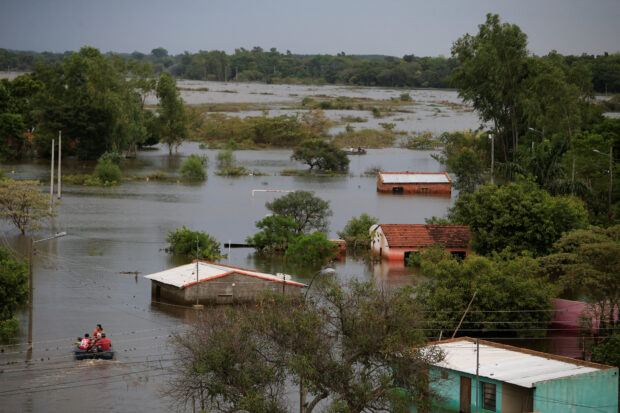
People ride in a boat in a flooded area after the Parana river overflowed its banks due to heavy rain upstream, in Ayolas, Paraguay, November 8, 2023. REUTERS/Cesar Olmedo
AYOLAS, Paraguay — Heavy rains caused by the El Niño weather phenomenon have sent hundreds to shelters in the town of Ayolas in southern Paraguay, with residents bracing for more flooding on the way.
At least five neighborhoods in the town, about 186 miles (300 km) from the capital, Asuncion, were left underwater after storms last week caused the Parana River to burst its banks.
Some 35,000 people throughout the country were affected by the rains, according to national emergency ministry estimates, while local authorities in Ayolas, near the border with Argentina, said about 3,700 were displaced.
“They warned us that the water was rising a lot, so the whole family came out to the street,” said 61-year-old Ayolas resident Pascacio Mercado. “By dawn, the water had reached my house and my neighbors’ and began to pour in.”
READ: Explainer: How El Niño is helping drive heatwaves and extreme weather
On Wednesday, some children were seen taking alternative methods to get to school, navigating small boats through the city’s still-flooded streets.
“I left my house before the floods came, so I came here to set up camp,” said 51-year-old shoemaker Mariano Medina, sitting under a tarp.
READ: How El Niño could impact health, food and the economy
Weather experts predict more storm clouds to roll in over the weekend due to the El Niño effect, caused by a warming of the Pacific Ocean and spurring extreme weather events across the Americas.
“El Niño is already in effect,” said Eduardo Mingo, head of Paraguay’s meteorology institute. “We were waiting for it to show its face, and now we’re seeing that it’s hitting the south-southeast with these intense rains.”
READ: UN warns world to prepare for El Niño impact
The World Meteorological Organization said Wednesday that El Niño will last until at least April 2024, raising temperatures in a year that is on track to be the warmest on record.

